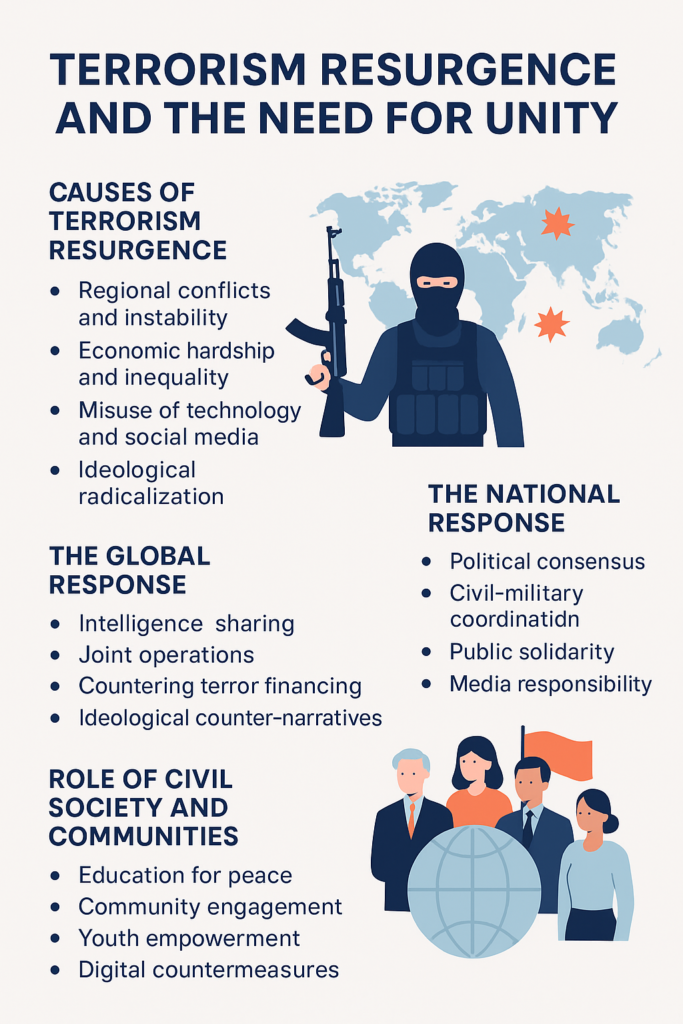Terrorism Resurgence and the Need for Unity
Introduction
The resurgence of terrorism poses one of the greatest threats to peace and stability in the 21st century. Despite decades of counterterrorism operations, extremist groups continue to re-emerge in conflict-ridden regions, exploiting weak governance, economic crises, and ideological divisions. To confront this menace effectively, unity at the national and international levels is essential. Without solidarity, counterterrorism strategies remain fragmented and ineffective.
Causes of Terrorism Resurgence
Regional Conflicts and Instability
Civil wars, failed states, and foreign interventions have created safe havens for militant groups. The Middle East, South Asia, and Africa remain hotspots where extremists regroup and expand their influence.
Economic Hardship and Inequality
Unemployment, poverty, and lack of education provide fertile ground for extremist recruitment. Disillusioned youth often fall prey to radical ideologies promising identity and purpose.
Misuse of Technology and Social Media
Extremist groups use digital platforms for propaganda, fundraising, and recruitment. Encrypted apps further complicate intelligence operations.
Ideological Radicalization
The misinterpretation of religion and identity-based extremism fuels divisions within societies. Extremists exploit polarization to spread hatred and violence.
The National Response: Why Unity is Essential
A country divided along political, ethnic, or sectarian lines cannot win the fight against terrorism. National unity strengthens resilience against extremist threats.
-
Political Consensus: Counterterrorism demands bipartisan cooperation; political rivalries weaken state responses.
-
Civil-Military Coordination: Effective counterterrorism requires collaboration between civilian authorities and security forces.
-
Public Solidarity: Citizens must reject sectarianism and extremist rhetoric, standing together against divisive ideologies.
-
Media Responsibility: Journalists must avoid sensationalism and provide awareness-based coverage that promotes unity.
The Global Response: International Cooperation
Terrorism transcends borders, making it a transnational challenge that no country can defeat alone.
-
Intelligence Sharing: Timely exchange of intelligence helps disrupt terror plots before execution.
-
Joint Operations: Multinational military and policing operations can dismantle global networks.
-
Countering Terror Financing: Stronger financial monitoring prevents money laundering and illegal funding of terror outfits.
-
Ideological Counter-Narratives: Cross-cultural dialogues and credible voices are needed to dismantle extremist propaganda.

Role of Civil Society and Communities
Governments alone cannot defeat terrorism. Civil society, educational institutions, and communities must play a proactive role.
-
Education for Peace: Promoting tolerance and critical thinking reduces susceptibility to radicalization.
-
Community Engagement: Local leaders and NGOs can provide alternatives to extremist recruitment.
-
Youth Empowerment: Job creation and skill development prevent frustration from turning into extremism.
-
Digital Countermeasures: Responsible use of media platforms can help counter extremist propaganda online.
Ethical and Human Rights Considerations
Counterterrorism strategies must not undermine human rights, as repression can lead to more radicalization.
-
Operations should respect rule of law and avoid targeting innocent civilians.
-
Rehabilitation programs for former extremists must balance justice with reintegration.
-
Unity in counterterrorism must mean not only security but also justice and dignity for all citizens.
Conclusion
The resurgence of terrorism is a reminder that extremism feeds on division, instability, and injustice. The most powerful weapon against it is unity—unity within nations, among political forces, across communities, and between states worldwide. Without solidarity, extremist groups exploit cracks in society and governance.
Terrorism thrives on chaos, but unity dismantles its foundations. Only through collective resolve, political will, and global cooperation can we safeguard peace and protect future generations from the cycle of violence.
Vocabulary for Enrichment
| Word | Urdu Meaning | Synonyms | Antonyms | Usage in Sentence | Part of Speech |
|---|---|---|---|---|---|
| Resurgence | دوبارہ ابھار | revival, reappearance | decline, downfall | The resurgence of terrorism poses new challenges. | Noun |
| Extremism | انتہا پسندی | radicalism, fanaticism | moderation, balance | Extremism undermines peace and social stability. | Noun |
| Solidarity | یکجہتی | unity, harmony | division, discord | National solidarity is vital to counter terrorism. | Noun |
| Propaganda | پروپیگنڈا | misinformation, promotion | truth, reality | Terrorist groups spread propaganda through social media. | Noun |
| Polarization | تقسیم | division, fragmentation | unity, cohesion | Political polarization weakens collective response. | Noun |
| Transnational | سرحد پار | cross-border, global | local, national | Terrorism is a transnational threat requiring cooperation. | Adjective |
| Rehabilitation | بحالی | reintegration, recovery | neglect, abandonment | Rehabilitation of former militants prevents relapse. | Noun |
| Counter-Narrative | متبادل بیانیہ | opposing narrative, rebuttal | endorsement, support | Counter-narratives are crucial to defeat extremist ideology. | Noun |
| Radicalization | انتہا پسندی کی طرف مائل ہونا | indoctrination, extremism | moderation, neutrality | Education can help prevent radicalization. | Noun |
| Coalition | اتحاد | alliance, partnership | separation, disunity | The coalition worked together against terrorism. | Noun |
Important CSS/Exam Questions
-
Analyze the factors contributing to the resurgence of terrorism in South Asia.
-
How can political and social unity strengthen the fight against terrorism?
-
Discuss the role of international cooperation in countering transnational terrorism.
-
Examine the impact of economic inequality and unemployment on extremist recruitment.
-
“Terrorism thrives on division; unity is its greatest enemy.” Discuss.
-
What role do civil society and education play in countering radicalization?
-
How can media and digital platforms be used both as a weapon by terrorists and as a tool for counterterrorism?
-
Evaluate the balance between counterterrorism measures and human rights protection.

